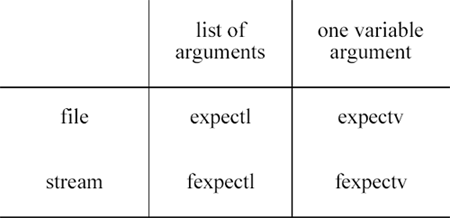What Characters Matched

Figure 21-2.
When an expect function returns, the variable exp_buffer points to the buffer of characters that were being considered for a match. exp_buffer_end points to one character past the end of the buffer. The buffer is null-terminated. If a pattern matches, the variable exp_match is set to point into the same buffer but at the position where the pattern first matches. The variable exp_match_end points to one past the last matching character. All of these variables are character pointers.
char *exp_buffer; char *exp_buffer_end; char *exp_match; char *exp_match_end;
Parenthesized subpatterns from regular expressions have their match information saved but only if the compiled form is used. Each regexp object includes the following members:
#define NSUBEXP 10 char *startp[NSUBEXP]; char *endp[NSUBEXP];
Each subpattern match is defined by a startp and endp pair. startp points to the start of the matching string, and endp points to one past the end of the matching string. startp[0] and endp[0] are identical to exp_match and exp_match_end. The remaining indices correspond to the parenthesized subpatterns in the original pattern. startp is set to 0 if the subpattern did not match.
For example, here is a fragment to print out all of the match information. In the loop, the submatch is temporarily null-terminated so that it can be printed. (The endp pointers are always ...
Get Exploring Expect now with the O’Reilly learning platform.
O’Reilly members experience books, live events, courses curated by job role, and more from O’Reilly and nearly 200 top publishers.

